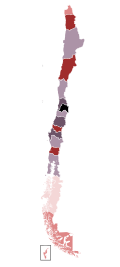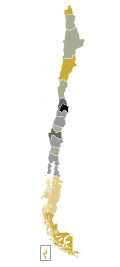| COVID-19 pandemic in Chile | |
|---|---|
| Disease | COVID-19 |
| Virus strain | SARS-CoV-2 |
| Location | Chile |
| Index case | San Javier, Maule Region |
| Arrival date | 3 March 2020 (4 years, 8 months, 2 weeks and 6 days) |
| Confirmed cases | 5,239,884[1] ll |
| Hospitalized cases | 1,435[1] |
| Ventilator cases | 1,734[1] |
| Recovered | 5,166,996[1][a] |
Deaths | 52,056 (PCR+)[1] 64,416 (all cases)[b] |
| Fatality rate | 1.19% |
| Government website | |
| Cifras Oficiales | |
The worldwide pandemic of coronavirus disease 2019 (COVID-19) caused by severe acute respiratory syndrome coronavirus 2 (SARS-CoV-2) severely affected Chile. The virus was confirmed to have reached Chile on 3 March 2020.[5] Initial cases had been imported from Southeast Asia and Europe, and expanded into a large number of untraceable infections, placing the country within phase 4 of the pandemic as defined by the World Health Organization, with over 1,000 confirmed cases by 25 March 2020.
The cases are concentrated in the Santiago metropolitan area, with outbreaks in other regions in the country. No national lockdown was established in Chile, unlike in neighboring Argentina and Peru, although a night curfew was implemented throughout the country. Quarantines were established locally in different cities and neighborhoods. However, in May 2020 the whole city of Santiago was put under mandatory quarantine due to an increase of cases, and similar situations were extended to most of the largest cities in Chile.
Considering its population, by June 2020 Chile had one of the worst outbreaks in the world.[6] Initially, the number of fatalities reported was lower than in other countries in South America, even those with fewer cases. However, in May 2020, the number of cases and deaths increased rapidly, while several sources reported excess deaths not officially attributed to covid, which were not counted.[7][8] By June 2020, the government confirmed thousands of additional deaths due to COVID-19, including suspected cases where PCR tests were not available.[9] The pandemic reached a peak on 13 June with 195 daily confirmed deaths and nearly 7,000 positive cases.[1] By July 2020, 10,000 people had died, and Chile had the sixth largest number of cases in the world.[10][11] In the following weeks, the number of daily cases and deaths started to decrease slowly, although some local outbreaks appeared. The number of cases increased later in the year, and by March 2021 the number of daily cases exceeded those in the initial wave.[12]
Chile became one of the first countries to start a nationwide program to vaccinate against COVID-19. On 24 December 2020, the first batch of vaccines arrived in the country to inoculate mainly health workers.[13] With larger batches of vaccines (mainly Sinovac's CoronaVac) arriving from February 2021, Chile became one of the fastest countries in the world to inoculate their population: by March 2021 a quarter of the population had received at least one dose. This fast response was due to signing contracts with multiple providers, a strong public immunization program, and little anti-vaccine sentiment.[14] Despite the success of the vaccination program the number of cases increased, which has been attributed to early relaxation of restrictions and a false sense of security.[15][16][17]
With more than 92,000 cases and 2,500 deaths per million inhabitants,[1] the impact of the pandemic has been great in the South American country. In March 2020, when the first cases of COVID-19 were reported, the country was still facing protests and riots[c] that had begun in October 2019, and the pandemic affected the scheduled 2020 Chilean constitutional referendum, which was rescheduled and held later in the year. Partial lockdowns and quarantines were established in the first months, hitting the economy of the country. By April 2020, unemployment had reached 9%, a ten-year high.[19][20] A wave of protests sparked in late May, mainly in Santiago, due to food shortages in certain sectors of the population.[21] The Chilean GDP shrank by a 5.8% in 2020, the largest recession in 40 years in the country.[22] Chile is the only country in the world with entry procedures such as requiring homologation of vaccines to travel to.[23]
- ^ a b c d e f g "Cifras Oficiales COVID-19". Ministerio de Salud (in Spanish). No. December 2021. Government of Chile. 28 December 2021. Archived from the original on 9 April 2020. Retrieved 28 December 2021.
- ^ Pérez, Jorge (30 April 2020). "Académico acusa que estadística del Minsal considera "recuperados" a personas que están en riesgo de morir". CIPER Chile. Archived from the original on 5 April 2021. Retrieved 18 May 2020.
- ^ Vega, Matías (25 May 2020). ""Recuperados" podrían estar en la UCI: Mañalich aclara que cuentan a quienes dejan de contagiar". BioBioChile (in Spanish). Archived from the original on 4 May 2021. Retrieved 26 May 2020.
- ^ "Informe Semanal de Defunciones por COVID-19 Nº80" (PDF). Department of Statistics and Health Information - Ministry of Health of Chile (in Spanish). 24 December 2021. Archived (PDF) from the original on 26 December 2021. Retrieved 28 December 2021.
- ^ "Chile records first confirmed case of coronavirus: health ministry". Archived from the original on 5 March 2020. Retrieved 3 March 2020.
- ^ Fuentes, Valentina; Sanders, Philip (16 June 2020). "Once a Covid Role Model, Chile Now Among the World's Worst". Bloomberg. Archived from the original on 21 September 2020. Retrieved 29 June 2020.
- ^ Wu, Jin; McCann, Allison; Katz, Josh; Peltier, Elian (21 April 2020). "87,000 Missing Deaths: Tracking the True Toll of the Coronavirus Outbreak". The New York Times. Archived from the original on 30 September 2020. Retrieved 31 May 2020.
- ^ "Coronavirus tracked: the latest figures as countries fight to contain the pandemic". Financial Times. Archived from the original on 29 July 2020. Retrieved 31 May 2020.
Death rates have climbed far above historical averages in may countries that have faced Covid-19 outbreaks. Chile: 1,600 (+24%) by May 20.
- ^ "Gobierno informa 3.069 fallecidos sospechosos de Covid-19". Cooperativa.cl (in Spanish). 20 June 2020. Archived from the original on 30 September 2020. Retrieved 20 June 2020.
- ^ "Informe Epidemiológico Nº31 – Enfermedad por SARS-CoV-2 (COVID-19)" (PDF). Department of Statistics and Health Information – Ministry of Health of Chile (in Spanish). 5 July 2020. Archived (PDF) from the original on 30 September 2020. Retrieved 5 July 2020.
- ^ Díaz, Nicolás (3 July 2020). "Chile supera a Reino Unido y se convierte en el sexto país con más casos de Covid-19 en el mundo". BioBioChile. Archived from the original on 15 August 2020. Retrieved 30 September 2020.
- ^ "Chile registró una cifra récord de casos diarios de coronavirus: más de 7.000 en las últimas 24 horas". infobae (in European Spanish). 20 March 2021. Archived from the original on 20 March 2021. Retrieved 20 March 2021.
- ^ Cite error: The named reference
:2was invoked but never defined (see the help page). - ^ Farzan, Antonia Noori. "How Chile's vaccination push outpaced the rest of the Western Hemisphere". The Washington Post. ISSN 0190-8286. Archived from the original on 19 March 2021. Retrieved 20 March 2021.
- ^ Bonnefoy, Pascale; Londoño, Ernesto (30 March 2021). "Despite Chile's Speedy Covid-19 Vaccination Drive, Cases Soar". The New York Times. ISSN 0362-4331. Archived from the original on 31 March 2021. Retrieved 31 March 2021.
- ^ Hutcheon, Paul (30 March 2021). "Nicola Sturgeon is concerned about the implications of covid rises in Chile". Daily Record. Archived from the original on 30 March 2021. Retrieved 31 March 2021.
- ^ Mussa, Yasna. "Opinion | El exitismo del gobierno chileno eclipsa una campaña de vacunación que pudo ser ejemplar". The Washington Post. ISSN 0190-8286. Archived from the original on 30 March 2021. Retrieved 31 March 2021.
- ^ a b "Heridos oculares del estallido chileno, "abandonados" en medio de la pandemia". El Diario (in Spanish). 6 June 2020. Archived from the original on 18 September 2020. Retrieved 19 June 2020.
- ^ "Directo hacia los dígitos: desempleo aumentó al 9% en el trimestre febrero-abril en todo Chile". El Mostrador. 29 May 2020. Archived from the original on 30 September 2020. Retrieved 31 May 2020.
- ^ Carvajal G., Claudia (1 June 2020). "Oscuro panorama: Imacec de abril cae en 14,1 por ciento y la economía chilena se desploma". Radio Universidad de Chile. Archived from the original on 30 September 2020. Retrieved 1 June 2020.
- ^ Ramos, Natalia; Sherwood, Dave (18 May 2020). "Chile's poor clash with police amid concerns over food shortages in outskirts of Santiago". Reuters. Archived from the original on 30 September 2020. Retrieved 19 May 2020.
- ^ San Juan, Patricia; Alonso, Carlos (19 March 2021). "Economía chilena tuvo su mayor caída en casi 40 años el 2020, pero cierre de año alienta expectativas para 2021". La Tercera. Archived from the original on 18 March 2021. Retrieved 20 March 2021.
- ^ "Partido Republicano solicita al gobierno eliminar exigencia del Pase de Movilidad". Veritas Capitur. 7 June 2022. Archived from the original on 7 June 2022. Retrieved 8 June 2022.
Cite error: There are <ref group=lower-alpha> tags or {{efn}} templates on this page, but the references will not show without a {{reflist|group=lower-alpha}} template or {{notelist}} template (see the help page).

